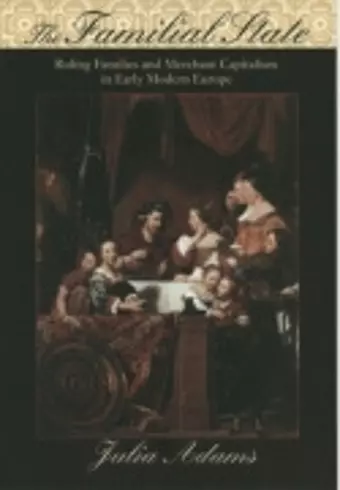The Familial State
Ruling Families and Merchant Capitalism in Early Modern Europe
Format:Paperback
Publisher:Cornell University Press
Published:16th Jul '07
Currently unavailable, and unfortunately no date known when it will be back
This paperback is available in another edition too:
- Hardback£50.00(9780801433085)

The seventeenth century was called the Dutch Golden Age. Over the course of eighty years, the tiny United Provinces of the Netherlands overthrew Spanish rule and became Europe's dominant power. Eventually, though, Dutch hegemony collapsed as quickly as it had risen. In The Familial State, Julia Adams explores the role that Holland's great families played in this dramatic history. She charts how family patriarchs—who were at the time both state-builders and merchant capitalists—shaped the first great wave of European colonialism, which in turn influenced European political development in innovative ways.
On the basis of massive archival work, Adams arrives at a profoundly gendered reading of the family/power structure of the Dutch elite and their companies, in particular the VOC or Dutch East India Company. In the United Provinces, she finds the first example of the power structure that would dominate the transitional states of early modern Europe—the "familial state." This organizational structure is typified, in her view, by "paternal political rule and multiple arrangements among the family heads."
Seldom have two hundred pages displayed such ambitious goals and achieved them with such a remarkable fluency. Julia Adams examines state formation and familial institutions in three early modern European countries: the Netherlands, France, and England. In so doing, she restores the Dutch experience to the centrality that it commanded in the seventeenth century. The book also suggests to national historians and historical sociologists that a narrow focus just cannot answer the big questions posed by the very histories so ubiquitously practiced by the current generation of one-nation historians. Comfortable being both genuinely comparative and firmly grounded in her own field, historical sociology, Adams further argues that the old categories deployed by historical analysis—state structures, class, religion, and patronage—cannot address the complexity of power without also addressing gender—more precisely, patrimony—as a force of immense historical significance.... This is a book that should now become required reading in every graduate seminar in early modern European history. It challenges us all to think outside the box that is the history of the nation, and it rewards such thinking with fresh insight into issues of gender, class, and state formation. It is a triumph.
-- Margaret C. Jacob * Journal of Modern Histo- Winner of Winner of the 2006 Gaddis Smith Book Prize (The Ma.
ISBN: 9780801474040
Dimensions: 229mm x 152mm x 18mm
Weight: 454g
252 pages